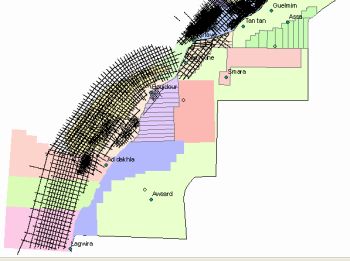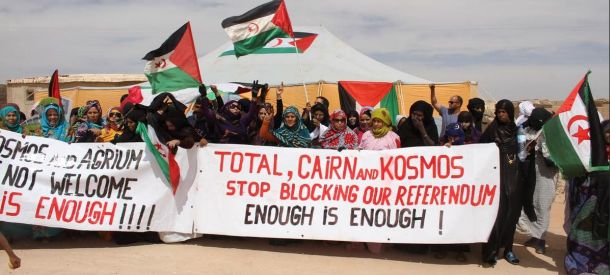
The Moroccan state owned oil company ONHYM has established new oil blocks in Western Sahara. The illegal programme could double the acreage in the occupied territory.
Maps available via the website of the Moroccan state oil company ONHYM reveals that the Moroccan government has drawn up five new oil blocks in occupied Western Sahara.
According to international law, this oil exploration is illegal, since the Sahrawis' wishes have not been taken into account. Western Sahara is under Moroccan occupation, and is defined by the UN as an unresolved colonial issue. In 2002, the UN's legal office gave a statement on the legality of Morocco's oil agreements. Yet, Morocco proceeds with their oil programme.
The newly drawn oil blocks constitute of 2 large areas onshore, and 3 offshore Western Sahara, each of the 5 being approximately 15.000 sq.km. The two onshore blocks are located directly to the east and south of ONHYM’s own Boujdour onshore block, while the three offshore blocks lie to the south of Kosmos Energy’s offshore acreage. If succeeding attracting firms to the illegal programme, Morocco would be more than doubling its acreage in the occupied territories.
The area offshore southern parts of Western Sahara, where 3 of the blocks lie, were originally held by Total from 2001, but the French firm abandoned the block in 2004, after having done seismic studies in 2002.

For long time, however, there have been signs of Morocco’s plan to pick up the offshore plans where Total left.
Already in 2006, the firm Atlas Sahara of the omnipresent Derhem Group, expressed interest in Dakhla Offshore vis-à-vis ONHYM, according to ONHYM’s annual report from 2006. The following year, ONHYM claimed that "international firms" had expressed interest in the same area, without specifying further.
In 2009, ONHYM completed public tender processes for the reprocessing of 1000 kilometer of the 2D seismic data that originated from Total’s past work offshore Dakhla, with the help of the Norwegian seismic services firm TGS-Nopec. See various ONHYM tender documents: Doc 1, Doc 2, Doc 3, Doc 4, Doc 5.
According to ONHYM’s budgetary plans for 2010, the state oil company planned to recruit an external consultant to make a study on the “Dakhla Offshore project”.
In a summarised 2010 annual report, published in March 2011, ONHYM states that the 1000 km reprocessing now had been done.
It is not clear who have done the processing of the data. It appears from ONHYM’s webpages that the Romanian firm Prospectiuni at one point showed interest in the processing the Dakhla data, but that they only wished to do parts, not all, of the tasks described in the reprocessing tender. Prospectiuni has carried out geological work in Western Sahara before.
Several European geologists, attached to research institutions in France, Portugal and Norway, have also been involved in researching geology of the territory, in cooperation with Total - even after Total formally withdrew from the territory. One of them was attached to a Norwegian research institution that in 2009 showed scepticism towards the academic work on the occupied land. The director of the institute “regretted” that a geologist attached to their institution had erroneously labeled Dakhla as being situated in Morocco, and made clear that the institution did not support this research.
Total paid near 4 million to occupier for oil block
Total officially states it has left Western Sahara
"The contract was not extended in December 2015", company writes on website. It has also confirmed that it has "no plans" to return to the territory, which lies in the part of Western Sahara under Moroccan occupation.
Norwegian investor excluded Total due to Western Sahara involvement
Total has left occupied Western Sahara
The French multinational oil company has announced that it is no longer pursuing oil search offshore Western Sahara. "More good news for the Saharawi people. We urge the remaining oil companies to follow suit", stated WSRW.


